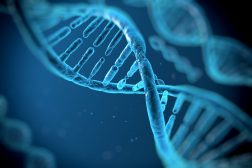Hcg –>
human chorionic gonadotrophin
(Science: hormone tumour marker) a hormone that is produced by the developing placenta and by the fertilized egg after implantation in the uterine wall.
this hormone is measured in the blood to determine pregnancy. Human chorionic gonadotrophin increases in quantity through the first trimester of pregnancy and begin to taper off after 85 days.
serum human chorionic gonadotrophin testing is accurate 48 hour post conception. Urine human chorionic gonadotrophin testing is a popular method of home pregnancy determination as human chorionic gonadotrophin can be detected in urine.
Acronym: hcg
Dictionary > Hcg
You will also like...

The Origins of Life
This tutorial digs into the past to investigate the origins of life. The section is split into geological periods in the..

Still Water Animals
Animals living in aquatic habitats have diversified and evolved through time. They eventually occupy ecological niches a..

Genetic Control – On and Off Genes
Genes are the blueprint of our bodies, a blueprint that creates a variety of proteins essential to any organism's surviv..

Abiotic Factors – Water Conditions
A still body of water may be disturbed by a variety of factors. One of them is wind. In fact, it is considered as the pr..

Biological Cell Introduction
It only takes one biological cell to create an organism. A single cell is able to keep itself functional through its 'mi..

Consciousness and Behavior
Human consciousness and behavior are an interesting topic since they are determined and controlled by the brain. Conscio..

